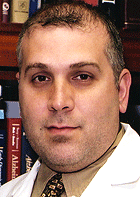Parkinson’s disease is well known for impairing movement and causing tremors, but many patients also develop other serious problems, including sleep disturbances and dementia.
For the first time, School of Medicine researchers have modeled Parkinson’s-associated dementia. They have shown that a single night of sleep loss in genetically altered fruit flies caused long-lasting disruptions in the flies’ cognitive abilities comparable to aspects of Parkinson’s-associated dementia. Then they blocked this effect by feeding the flies large doses of the spice curcumin, a derivative of the spice turmeric.

Galvin
Author James Galvin, M.D., associate professor of neurology, of psychiatry and of neurobiology, and senior author Paul Shaw, Ph.D., assistant professor of neurobiology, published their results in a recent issue of the journal Sleep.
Galvin is an expert in cognitive impairments in human Par- kinson’s disease, and Shaw studies sleep and the brain in fruit flies. The researchers collaborated based partly on evidence showing that increased sleep loss in Parkinson’s patients can precede or coincide with increased severity in other Parkinsonian symptoms.
More than 74 percent of Parkinson’s patients have trouble sleeping, and up to 80 percent of patients over 65 who have Par-kinson’s disease for seven years will develop dementia, Galvin said.
Shaw’s lab has linked sleep loss to changes in the dopaminergic system of the brain, which produces the neurotransmitter dopamine and is at the center of the damage Parkinson’s causes.
“In healthy flies, sleep deprivation decreases dopamine receptor production and causes temporary learning impairments that are fully restored after a two-hour nap,” Shaw said.
Shaw and Galvin studied fruit flies genetically modified to make a human protein called alpha-synuclein in their brains. Scientists have shown that it aggregates in the brains of Parkinson’s disease patients and say the processes that cause the aggregations are harming dopamine-producing cells.
Tests showed that flies with alpha-synuclien in their brains could still learn when they were middle aged. But when deprived of sleep for 12 hours, their ability to remember was more severly impaired than young, healthy, sleep-deprived flies.
Galvin had earlier found that curcumin blocks alpha-synuclein aggregation in cell models of Parkinson’s disease. Based on this, researchers fed curcumin to a new batch of flies, repeated the tests and found middle-aged flies with alpha-synuclein retained their ability to learn as well as normal young flies.
“Thanks to this model our labs have created, Dr. Galvin and I can not only quickly test potential new treatments for these symptoms of Parkinson’s, we can also move up our treatments in terms of the timeline along which the disorder develops,” Shaw said.
“That may give us a real chance to change the course of the disease,” he said.